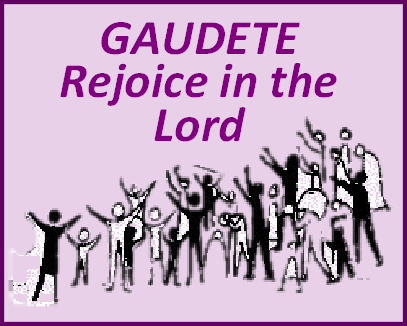11 December 2022
Isaiah 35:1-6,10 James 5:7-10 Matthew 11:2-11
Theme: ‘Rejoice in the Lord always’ (Phil 4.4)
Today is the third Sunday of Advent, Gaudete Sunday, the Sunday of joy. Our Eucharistic liturgy today echoes this joy. In our opening prayer we prayed to the Father to help us experience the joys of the salvation Christ has won for us ‘and celebrate them always with solemn worship and glad rejoicing’. In our first reading, the prophet Isaiah invites nature to join in this rejoicing: ‘Let the wilderness and the dry land exult, let the wasteland rejoice and bloom, let it bring forth flowers like the jonquil, let it rejoice and sing for joy’ (Is 35:1). The responsorial psalm proclaims the praises of God ‘who gives sight to the blind, raises up those who are bowed down, protects the stranger and upholds the widow and orphan’ (Ps 145). And our gospel reading from Matthew invites us to embrace Jesus as the Messiah, the saviour, whose life and ministry manifest the saving power of God: ‘the blind regain their sight, the lame walk, lepers are cleansed, the deaf hear, the dead are raised to life, and the poor have the good news proclaimed to them’ (Mt 11:3).
Too often in the past, Christianity has been presented as a rather grim and joyless affair, confronting us with guilt and failure. In an interview he gave a short time before his death, Terry Wogan, the well-known Radio and TV broadcaster, described his experience of growing up in Catholic Ireland in these depressing terms: ‘There were hundreds of churches, all these missions breathing fire and brimstone, telling you how easy it was to sin, how you’d be in hell.’ Sadly, Terry’s perception of Holy Catholic Ireland would have been shared by many of his contemporaries. However, it is a distorted perception based on the ‘hell-fire sermons’ of zealous but misguided preachers.
Today’s gospel reading shows us that John the Baptist, too, for all his greatness – ‘a greater than John the Baptist has never been seen’ (Mt 11:11) – and zeal, may also have been misguided about Jesus and his message. When he heard what Jesus was doing he was disturbed and confused, so he sent some of his disciples to ask Jesus if he was the promised Messiah ‘or have we got to wait for someone else?’ (Mt 11:3). The response of Jesus is to point to the incontestable evidence of his healing and life-giving ministry: ‘Tell John what you hear and see’ (Mt 11:4). His actions prove that he is the Messiah foretold by Isaiah, the one who embodies God’s healing love.
The reality of sin and failure is not the centre piece of the Christian story, but rather the victorious love of God who forgives, heals and makes all things new. And it is the experience of this love that is the source of our joy. But what is this joy that is at the heart of the Christian message? We think of joy very much in association with youthfulness, freshness, innocence. And it is true that joy keeps us young. A joyful person seems always youthful. Like the kiss of the sun on a flower, or a smile lighting up a child’s face, joy transforms. People who are joyful transform those around them. Joy is contagious. In the presence of joyful people, our hearts become lighter and the world around us seems so much brighter.
However, Christian joy must not be confused with the kind of superficial cheerfulness we often come across in our social gatherings. It is not the false hilarity of those who choose to ignore the reality of suffering in the world around them, or avoid pain in their own lives. In the words of John Catoir, ‘Joy is not the absence of pain. It is the awareness of God’s loving presence within you.’ And this awareness is a gift of the Holy Spirit. Christian joy is quite compatible with sorrow and even with anger. As Christians we are called to share not only in the passion of Christ, but also in his passions – his joy and sorrow, his frustrations. These are the passions of those who are alive with the gospel, those who come to know from personal experience that ‘it is in giving that we receive; it is in pardoning that we are pardoned, and in dying that we are born to eternal life’ (Prayer of St Francis).
The joy that Christ brings us is a joy that is often found in the midst of pain and suffering. The most joyful people I have come across in my life as a missionary priest were those who had been profoundly touched by the pain of the world. I give just one example among many. Several years ago, an Irish Lay Missionary, Barbara McNulty, worked among the poor in Brazil. She wrote a memorable account of her experience for an article in The Tablet, describing how she found joy in the heart of suffering. ‘It is the paradox of joy that it is at its most significant in association with suffering. I worked for many years with the sick and the dying in a place where one would expect to find despair and depression; yet because of the warmth of the love all around me I found laughter and hope’. As disciples of Jesus, we are invited, like Barbara McNulty, to share the joy Jesus offers us, the joy we discover when we reach out to others in love.
Fr Michael McCabe SMA, December 2022
To listen to an alternative Homily from Fr Tom Casey of the SMA Media Centre, Ndola, Zambia please click on the play button below.
|
|

